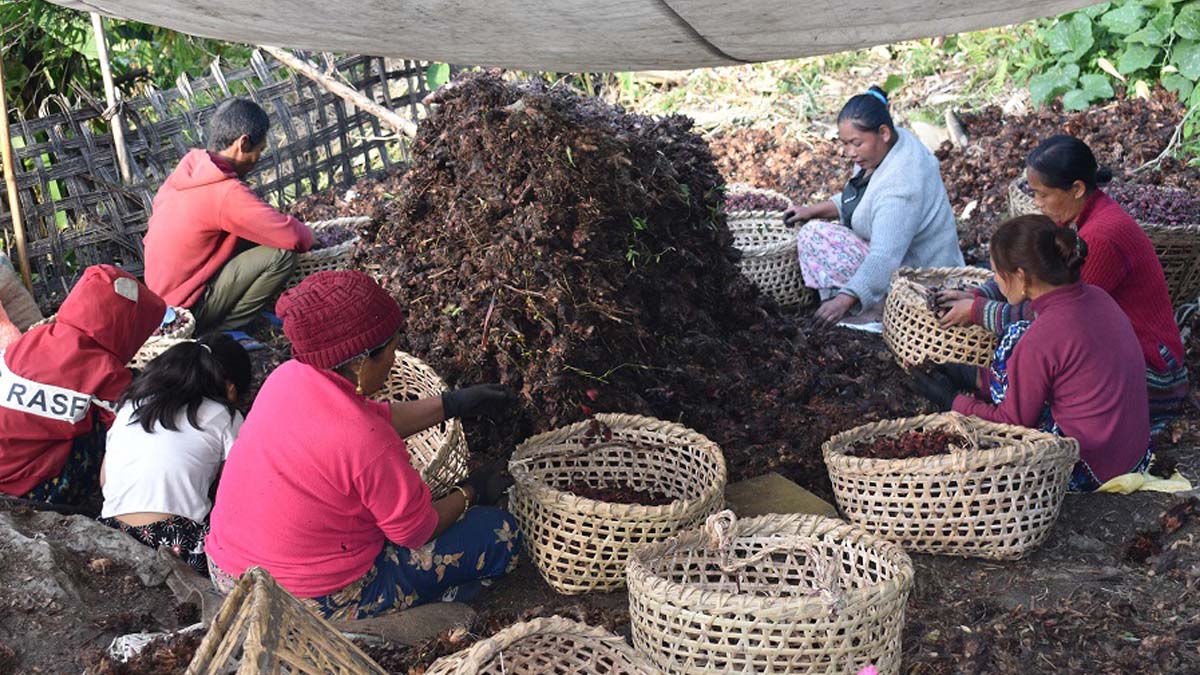
Farmers of Lamjung find their calling in black cardamom farming

Large cardamom farming has attracted farmers of Lamjung district with its good incomes. Most of the farmers of the district have engaged in the farming as it has generated good incomes lately, said local people. One of them is Ajaya Tamang of Marsyangdi Rural Municipality-7. He expanded the farming to 40 ropani of land from one ropani 15 years ago. He earned anything between Rs 1 million and Rs 1.5 million in income annually by selling cardamom and its saplings. He engaged in the business when Nepal’s bigger cardamom nursery was established at Tarachowk Shera and Chhinkhola. The nursery spans 55 ropani of land.
“I would earn Rs 300,000 annually from a foreign job. But, now I got more than Rs 1 million in income annually from the business at home,” He is also outgoing chairperson of the Federation of Large Cardamom Entrepreneurs of Nepal, Lamjung and its coordinator of the Gandaki Province. He has also come up with a drive to encourage foreign job aspirants into the farming.
Som Bahadur Tamang of Ludi in the rural municipality has grown large cardamom in 60 rupani of land after spending 15 years of his life at foreign jobs. He was generating around Rs 500,000 in income annually from the business.
“I am finding it easier to support for my family from incomes from the business. It generates good incomes than that from growing paddy and corn,” he said, adding that 10 quintals of large cardamom were produced this year.
Attracted by lucrative incomes from it, a group of 42 farmers of Barapokhari has grown large cardamom in 1,500 ropani of land by registering agriculture’s group, he said.
Balaram Lama of Chhinkhola has also grown cardamom. He drew over Rs 500,000 in income annually from the business. Started some 45 years ago, grand cardamom, also known as ‘black gold’, black cardamom and locally called ‘alainchi’, has been a lucrative business in the district.
Although the farming has been done in 1,500 hectares of land, only 1,200 hectares have been producing cardamom, according to available data. This year, the district saw an 85 percent increment in cardamom production as compared to 35 metric tonnes last year, farmers have estimated. The high value cash crop, which is used as medicinal herb and spices as well, is in high demand. The evergreen, perennial and herbaceous plant is grown on north-facing hill slopes, according to the government.
Black cardamom is being supplied to various countries including neighbouring India. Pocket area for the farming is Marsyangdi Rural Municipality, Bensisahar Municipality, Kyoholasothar Rural Municipality, Dordi Rural Municipality and Dudhpokhari Rural Municipality. One kilogram black cardamom fetches from Rs 600 to Rs 700. The government should make ‘decent’ arrangements for the farming, Tamang demanded.
- Seven-Year-Old Boy Survives Five Days in Zimbabwe’s Lion-Infested National Park
- Taiwan Reports First Chinese Combat Patrol of the Year Amid Renewed Call for Dialogue
- Political Leader Ishwar Pokharel’s Memoir “Mother, Dream and Stars” Launched
- Thai PM Declares $400 Million in Assets, Including Luxury Watches and Handbags












Comments